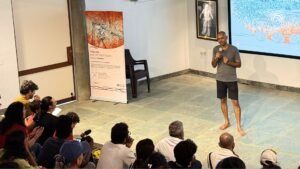
The township near Puducherry that was envisaged as ‘belonging to nobody in particular and belonging to humanity as a whole’ is at the half-century mark. For five decades its residents have given up personal wealth and immersed themselves in service to the community. It is as good a time as any to evaluate the successful and not-so-successful results of this experiment in ‘spiritual communism’
M Ramesh | Updated on February 23, 2018
As we drove down a dirt track, Balu Ramalingam pointed to a tree stump that was nearly fully hidden by the surrounding thick foliage and said ruefully that, but for a recent cyclone that ripped off many trees like this one, the forest would have been denser.
Denser? It was already so thickly forested that barely any sunlight filtered through the canopy and, though the mud track was less than a kilometre from the highway, you couldn’t hear the toot of even a single motor horn — not quite the scene you’d expect to find barely 165 km south of Chennai. We are inside Auroville, located in Viluppuram district of Tamil Nadu, with some parts falling in the union territory of Puducherry. Incredulity shoots up when you learn that the forest is entirely man-made, the result of years of meticulous silviculture. Three million trees occupy 1,250 acres of afforested land, which is half the area of Auroville.
Fifty years ago, this was a sun-scorched, barren land on which stood a solitary banyan tree. The transformation began when around 300 foreigners settled here, answering a call from ‘The Mother’ Blanche Racheal Mirra Alfassa. Driven by a spiritual quest, Alfassa left her home in France for good in the 1920s and arrived at the Aurobindo Ashram near Puducherry (earlier Pondicherry). She soon came to be recognised as the ‘spiritual collaborator’ of the ashram’s founder, the Cambridge-educated Bengali freedom fighter-turned-spiritual reformer Sri Aurobindo. After the seer passed away in 1950, Alfassa continued his work in the ashram.
On February 28, 1968, she embarked on what would prove to be her lifelong quest — the creation of Auroville, an experimental city in which people from all over the world could come and live in “progressive harmony”, casting aside divisions of class, creed and politics.
It was a place for people who were dissatisfied, as she had been, with the world. One of her epigrams goes like this: “For those who are satisfied with the world as it is, Auroville obviously has no reason to exist.”
****
Five decades later, Auroville is still evolving as per its Master Plan, but has grown into a city — well, a city of sorts, because it is still missing several urban features — there is no police station, for instance, nor a courtroom. Few roads are paved and most others have been deliberately left unpaved, unnamed and unlit. There is no pub (those who want to drink either do it surreptitiously or go to Puducherry next door), there is no bus terminus or railroad, no public transport, and no temples, churches or mosques.
What it does have is a stylish town hall, plenty of garden restaurants, schools that look unconventional, business units including farmlands, and a clutch of single-storey residential buildings. The defining feature of the township is the Matrimandir, a golden-domed meditation hall that has a specially-made crystal ball, on which a heliostat always focuses sunlight. The beautifully landscaped area around the Matrimandir has a largish amphitheatre. In its totality, Auroville closely resembles a university campus.
The real distinction, however, is that nothing is owned by anybody here. Every single asset is owned by the community, which is represented by the Auroville Foundation, which, in turn, is — hold your breath — owned by the Ministry of Human Resource Development, Government of India, and administered by a government-appointed retired bureaucrat.
The Indian government entered the picture by invitation.
When Auroville was first set up, the Sri Aurobindo Society legally owned all the assets. However, after the Mother’s death in 1973, friction developed between the residents and the society. The residents appealed to Prime Minister Indira Gandhi to intervene. The society tried to fight off governmental intervention — and lost. The Parliament passed The Auroville Foundation Act, 1988, effectively taking over the ownership.
The foundation has a governing board, an international advisory council and a residents’ assembly. The board members are eminent personalities, and the incumbent chairman is the Congress leader and Rajya Sabha member Karan Singh.
The residents’ assembly, assisted by a working committee, decides most matters, including the construction of buildings or issuing residence permits. It is within this governing framework that the experiment of ‘spiritual communism’ is being carried on.
On February 28 this year, the township will re-enact a symbolic event that marked the day Auroville formally came into being 50 years ago — people from 121 countries poured soil brought from their homelands into a lotus-shaped urn. The Mother then unveiled the four-point Auroville Charter, the first of which says: “Auroville belongs to nobody in particular. Auroville belongs to humanity as a whole. But to live in Auroville one must be the willing servitor of the divine consciousness.” She wanted a universal town where people would “realise human unity”.
In a way, Auroville resembles a command economy, but Deepti Tewari, a resident of 43 years who teaches there, says there is a difference. Taking off from the leitmotif of the French Revolution, ‘liberty, equality and fraternity’, Tewari reasons that capitalism gives liberty but destroys equality, while communism gives equality but destroys liberty. Fraternity ensures both liberty and equality. Auroville is a ‘fraternity’ where, instead of a top-heavy structure thrusting rules on the people, the entire community decides what it does for itself.
That also includes “an understanding” that nobody shall take a fellow Aurovillian to court; disputes shall be resolved internally. All serve the community, and the community takes care of them all.
Electricity is free — the township consumes around 35 lakh units a year. Schooling is free, and children are encouraged to learn the subjects of their choice at their own pace, and there are no exams. Students who want to go ‘outside’ for higher education will necessarily have to take an open examination elsewhere, and they usually do well in them. Bala Baskar, a former secretary of the Auroville foundation, says his Auroville-schooled son is a successful lawyer today. While the learning methods appear conducive for mathematics, humanities and computer education, it is not so for science education, as the labs are “rudimentary”, Baskar concedes.
Water is not free yet in Auroville, but basic medical facilities are. For more serious cases, two ambulances are on standby to transport the sick to Puducherry hospitals.
The foundation receives funds from different sources, including ‘donations’ paid by those seeking an accommodation, but which they will never own.
However, Auroville was conceived to be fully self-sustaining, driven by its own economy. The success of this economy is the key element of the Auroville experiment.
There are about 150 income-generating units owned by trusts set up by the foundation. These units are meant to generate enough funds for their own sustenance and also contribute (at least a third of their profits) to the foundation — any remainder is ploughed back into business but never goes to individuals. Maroma, which makes a range of handicrafts that are sold in Auroville shops across the country, is one of the larger commercial units. Auroville Bakery is another. Then there are farmlands owned by Auroville which serve the dual purpose of research in sustainable agriculture and water conservation, as also produce crops. A dozen restaurants earn money for the foundation from the 3,000-odd daily visitors.
Perhaps the best example of an Auroville commercial unit that is in complete alignment with the founding spirit, and also appears to be doing well, is Auroville Consulting, which employs 25 professionals. It was co-founded by Toine van Megen, a Dutchman who has been living in the township since the 1970s, speaks fluent Tamil, is married to a Tamilian, and was briefly the CEO of Suzlon Energy. Auroville Consulting provides advice and training in wind and solar energy generation, and sustainable development. It counts entities such as Tamilnadu Energy Development Agency and Tamilnadu Urban Finance and Infrastructure Development Corporation among its clients.
So successful are its training programmes that it now intends to build a ₹35-crore Centre for Green Practices for training services. van Megen is himself active in Indian solar energy policy development and lives in a house that is fully solar-powered.
Another of Auroville’s enterprises is the ‘Buddha Garden’, a farmland that is experimenting with a ‘precision irrigation system’ using sensors and controlled drip-irrigation (somewhat similar to Bosch’s attempt in Karnataka, only cheaper). The first crop (vegetables) cycles saw an 80 per cent drop in water consumption even as some yields doubled.
The economic units contributed ₹9.6 crore — 46 per cent of the township’s ₹21-crore income in 2016-17.
However, much still depends on grants and donations. A ‘utility fund’ received donations totalling ₹60 crore in 2014-15. Without such contributions, the township may not have survived. “Auroville is in its 50th year, but its economy is still not self-sustaining,” says Manuel Thomas, a Chennai-based chartered accountant, who has co-authored a book on Auroville’s economy. He reckons that most of the units remain ‘micro’ in nature. “The main reason is lack of access to capital. Most units start on unit-holders’ funds and small borrowings from friends,” he says.
With the handicrafts unit Maroma losing ground due to falling sales and high overheads, the future may well depend on the success of Auroville Consulting.
The economy is clearly under strain. “There is increasing awareness of the need for a sound economy and there are internal discussions ongoing to address this issue,” admits Thomas, while pointing out that Auroville is still an evolving entity.
The stressed economy is probably one of the reasons why the number of inhabitants has not grown. Auroville was conceived to accommodate 50,000 people — 50 years down the line, there are 2,136 adults and 690 children. The city was planned to be built over 200 sq km, but Auroville owns only 84 sq km till date. Any expansion would call for upfront payment by those wishing to move in.
Frederick, a German who has lived in Auroville since the early 1960s (“unable to come to terms with the barbarity of Nazi Germany”), says there are many waiting to come in. The place has a lure all its own — people who taste the life here, want to stay on. But not everyone is allowed to. There is a process involved. A newcomer initially stays as a volunteer for a fixed period, which used to be three months but is currently two years. This gives both the newcomer and the community time enough to decide whether she or he belongs here or not. Many, like the Austrian Martin Scherfler, who has been here for 12 years, came in for a look and decided to stay on, but some moved away. An ‘entry service group’ clears a person for permanent residence, followed by an approval from the residents’ assembly.
Ultimately, the question is, to what extent has this different model of living been successful. Tewari says that the very fact that Auroville has existed half a century is not just a matter of success but a “miracle”. Toine van Megen prefers to see it a little differently. He believes that if the “real Auroville” is meant to be an instrument of ‘inner development’, as envisaged by the Mother, then there is “still a lot to achieve”.
Both seem to be right because, while Tewari looks at the past, van Megen has his eyes on the future.
At the end of the first 50 years, Auroville is a veritable success. There are hordes of foreigners living in various ashrams in India — including the nearby Aurobindo Ashram, which is connected to Auroville only by the spirit of Sri Aurobindo’s teachings and nothing else.
But these ashrams are primarily religious communes. Aurovillians, in contrast, are hardly religious.
Ashrams have people living abstemious lives, Auroville doesn’t — its people may not be wild fun-seekers, but they are certainly not monks either. They give up their personal wealth and provide service to the community, but only in the spirit of pooling everything for common use. Unlike in an ashram, relationships freely happen and break here. Some smoke joint clandestinely. There are no rigid social norms.
But, for sure, there is a certain homogeneity among Aurovillians.
These are people who have chosen to hunker down and live quiet lives in harmony among themselves and with nature. It is hard to see the lab-scale success of Auroville being replicated elsewhere. Yes, when waters from over a 100 countries are poured into an urn in Auroville on February 28, Aurovillians can look back at the past five decades and allow themselves a smile of satisfaction.





